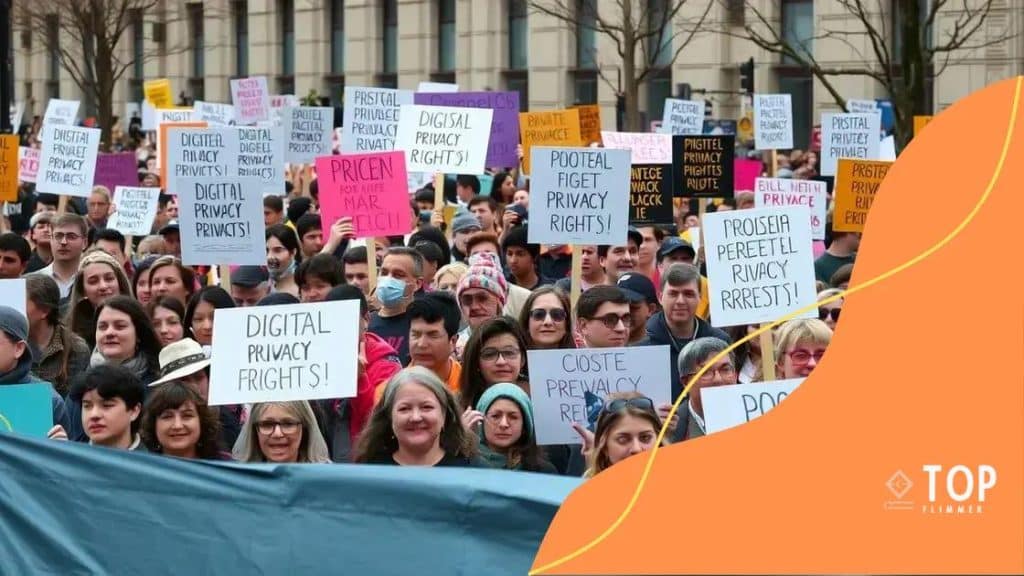Digital privacy rights protests nationwide gain momentum

Digital privacy rights protests nationwide are a response to growing concerns over data misuse, demanding stronger regulations and greater transparency from companies and governments regarding personal information protection.
Digital privacy rights protests nationwide are making headlines as communities rally for stronger protections in our digital lives. With technology evolving rapidly, many wonder how their personal information is being used.
The rise of digital privacy concerns
The rise of digital privacy concerns is a pressing issue in today’s technology-driven society. Many people are becoming aware of how their personal information is collected and used. This awareness is leading to a greater demand for transparency and protection of personal data.
Understanding Digital Privacy
Digital privacy refers to the rights and expectations of individuals regarding their personal information online. As technology evolves, so do the ways in which privacy can be compromised.
We often share personal data with various online services, and it can be surprising just how much information we give away.
Factors Contributing to Privacy Concerns
- Increase in data breaches and identity theft
- Invasive data collection practices by companies
- Government surveillance and monitoring
- Growing use of social media and its impact on personal privacy
With these factors at play, it’s no wonder that people are becoming more concerned about their digital rights. Many are beginning to investigate how to protect themselves.Awareness of these issues informs the public about their rights and encourages them to advocate for change.
Public Backlash and Demand for Change
In recent years, public backlash against companies and governments has intensified. Social media campaigns have mobilized people to speak out against privacy violations. This collective action has resulted in a rising tide of protests and demands for stronger regulations.
As people unite for their digital privacy rights, they push for laws that better protect user data and ensure accountability for companies mishandling this information.
Key organizations are stepping up as voices for the public, helping to educate people about their rights and encouraging them to take action.
Key issues driving protests
Many key issues driving protests around digital privacy rights stem from widespread concern over personal data misuse. As technology integrates more deeply into daily life, people are increasingly aware of their data being exploited.
Data Breaches
One prominent issue is the rise of data breaches. While companies collect vast amounts of personal information, the frequency of breaches has put countless individuals at risk. From financial details to personal communications, these breaches can have serious consequences for the victims.
- Identity theft
- Financial loss
- Emotional distress
- Long-term privacy concerns
These incidents often lead to public outcry as people demand accountability and better protections from companies failing to secure their data.
Invasive Surveillance Practices
Additionally, invasive surveillance practices are a significant driver of protests. Many feel that constant monitoring by governments and corporations is like an invasion of their personal space. Surveillance technologies can track movements, conversations, and even preferences without consent.
The implications of such practices raise serious ethical questions regarding rights and freedoms. The public is increasingly advocating for laws that limit such surveillance and protect individual privacy.
Lack of Transparency
Another fundamental issue is the lack of transparency regarding data collection and usage policies. Many companies use complex terms and conditions that are difficult to understand. As a result, people often unknowingly agree to terms that allow extensive data collection.
This lack of informed consent drives many to protest for clearer regulations and more straightforward policies that empower users to control their data.
How the public is responding

The public response to digital privacy rights protests has been robust and diverse. People are becoming more engaged as they realize the impact of data privacy on their lives. This growing awareness has led to increased participation in protests and a demand for change.
Increased Activism
Many individuals are joining grassroots movements or participating in rallies organized by advocacy groups. They are speaking out against practices that threaten their privacy and demanding more stringent regulations from both companies and governments. This activism is not only limited to large cities but has spread to communities nationwide, showing a united front.
- Social media campaigns amplifying voices
- Participation in town hall meetings
- Formation of local advocacy groups
- Petitions demanding policy changes
With social media serving as a powerful tool, activists are sharing information and mobilizing support. This connectivity helps to bring together like-minded individuals who share the same concerns.
Education and Awareness
Education about digital privacy rights is also a critical response. Many people are seeking resources to understand their rights and how to protect their personal information. Schools and organizations are offering workshops and seminars, helping to inform the public about the importance of privacy.
This newfound knowledge empowers individuals to take action and advocate for stronger protections. By being educated, citizens can make informed choices regarding their data and engage in meaningful discussions about privacy rights.
Community Collaboration
Communities are coming together in various ways to promote digital privacy. This collaboration includes online forums or local meetups where people can share experiences and strategies for protecting their privacy. These exchanges foster a sense of solidarity and collective effort in tackling privacy issues.
As public interest in these matters continues to grow, sustained pressure on legislators and companies has the potential to drive significant changes in policies regarding data privacy.
Organizations leading the charge
Numerous organizations leading the charge for digital privacy rights are making significant contributions. These groups work tirelessly to educate the public, lobby for legislative change, and advocate for stronger privacy protections.
Nonprofit Advocacy Groups
Several nonprofit organizations have emerged as powerful advocates for digital privacy. They focus on raising awareness about privacy issues and supporting individuals whose rights have been violated.
- Electronic Frontier Foundation (EFF)
- Privacy International
- American Civil Liberties Union (ACLU)
- Center for Democracy & Technology (CDT)
Each of these organizations takes a unique approach, from legal battles against unlawful surveillance to public education campaigns aimed at empowering people with knowledge about their digital rights.
Grassroots Movements
Grassroots movements are also integral to the fight for privacy rights. Many local groups mobilize communities to demand more rights and protections. They often hold rallies, workshops, and discussions to engage people in meaningful conversations about privacy.
Through these initiatives, communities can come together to effectively advocate for change at local, state, and national levels. The voices coming from these grassroots movements emphasize the urgency of digital privacy issues.
Collaborative Efforts
Collaboration between organizations is vital in the digital privacy landscape. By joining forces, they can pool resources, knowledge, and reach a broader audience. These partnerships enhance their effectiveness in advocating for policy changes.
Such collaborations often lead to comprehensive reports and campaigns, making a more significant impact on public perception and governmental policies regarding privacy rights. As their efforts continue, the push for enhanced digital privacy rights is gaining momentum.
Future of digital privacy rights
The future of digital privacy rights is a topic of great importance as technology continues to evolve rapidly. With increasing awareness of privacy issues, there is a growing expectation for stronger protections and regulations.
Emerging Technologies
New technologies, such as artificial intelligence and blockchain, are reshaping the digital landscape. These innovations can enhance security and privacy when implemented correctly. However, they also pose new challenges that require updated regulations.
- AI can analyze data efficiently, but it raises concerns about automated decisions.
- Blockchain technology offers secure transactions yet can lead to data permanence issues.
- Wearable devices collect personal data, making privacy policies critical.
- Internet of Things (IoT) devices increase data points but heighten risks if not properly secured.
As technology evolves, so must the frameworks regulating its use. This ensures that individual rights are upheld while allowing innovation.
Stronger Legislation
As public demand for privacy increases, so does the push for stronger legislation. More countries and states are enacting laws designed to protect personal data. These laws aim to give individuals more control over their information.
Regulations like the General Data Protection Regulation (GDPR) in Europe have inspired other regions to create similar laws. The trend indicates a movement toward comprehensive data protection frameworks worldwide.
Public Engagement and Education
The future also depends on how much the public understands their rights. Organizations will need to invest in education and awareness campaigns to inform people about their privacy rights.
As individuals become more informed, they can demand better practices from companies and support legislation that protects their data. This public engagement is crucial for shaping a future where privacy rights are respected and upheld.
FAQ – Frequently Asked Questions about Digital Privacy Rights
What are digital privacy rights?
Digital privacy rights refer to the protections and freedoms individuals have regarding their personal data and information online.
Why are digital privacy rights important?
They are essential because they help protect individuals from unauthorized data collection, misuse, and breaches, ensuring personal safety and autonomy.
How can I protect my digital privacy?
You can protect your digital privacy by using strong passwords, adjusting privacy settings on social media, and being cautious about the personal information you share online.
What role do organizations play in advocating for digital privacy rights?
Organizations advocate for stronger privacy laws, educate the public about their rights, and push for accountability from companies regarding data handling practices.






